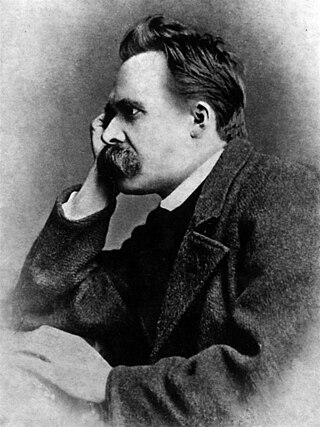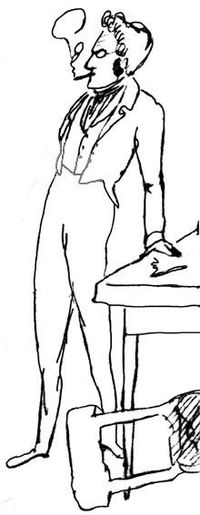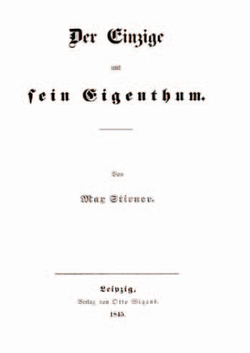In ethical philosophy, ethical egoism is the normative position that moral agents ought to act in their own self-interest. It differs from psychological egoism, which claims that people can only act in their self-interest. Ethical egoism also differs from rational egoism, which holds that it is rational to act in one's self-interest. Ethical egoism holds, therefore, that actions whose consequences will benefit the doer are ethical.
Egoism is a philosophy concerned with the role of the self, or ego, as the motivation and goal of one's own action. Different theories of egoism encompass a range of disparate ideas and can generally be categorized into descriptive or normative forms. That is, they may be interested in either describing that people do act in self-interest or prescribing that they should. Other definitions of egoism may instead emphasise action according to one's will rather than one's self-interest, and furthermore posit that this is a truer sense of egoism.
Individualist anarchism is the branch of anarchism that emphasizes the individual and their will over external determinants such as groups, society, traditions, and ideological systems. Although usually contrasted with social anarchism, both individualist and social anarchism have influenced each other. Some anarcho-capitalists claim anarcho-capitalism is part of the individualist anarchist tradition, while others disagree and claim individualist anarchism is only part of the socialist movement and part of the libertarian socialist tradition. Economically, while European individualist anarchists are pluralists who advocate anarchism without adjectives and synthesis anarchism, ranging from anarcho-communist to mutualist economic types, most American individualist anarchists of the 19th century advocated mutualism, a libertarian socialist form of market socialism, or a free-market socialist form of classical economics. Individualist anarchists are opposed to property that violates the entitlement theory of justice, that is, gives privilege due to unjust acquisition or exchange, and thus is exploitative, seeking to "destroy the tyranny of capital,—that is, of property" by mutual credit.
Individualism is the moral stance, political philosophy, ideology, and social outlook that emphasizes the intrinsic worth of the individual. Individualists promote realizing one's goals and desires, valuing independence and self-reliance, and advocating that the interests of the individual should gain precedence over the state or a social group, while opposing external interference upon one's own interests by society or institutions such as the government. Individualism makes the individual its focus, and so starts "with the fundamental premise that the human individual is of primary importance in the struggle for liberation".

Johann Kaspar Schmidt, known professionally as Max Stirner, was a German post-Hegelian philosopher, dealing mainly with the Hegelian notion of social alienation and self-consciousness. Stirner is often seen as one of the forerunners of nihilism, existentialism, psychoanalytic theory, postmodernism and individualist anarchism.

The Ego and Its Own, also known as The Unique and Its Property is an 1844 work by German philosopher Max Stirner. It presents a post-Hegelian critique of Christianity and traditional morality on one hand; and on the other, humanism, utilitarianism, liberalism, and much of the then-burgeoning socialist movement, advocating instead an amoral egoism. It is considered a major influence on the development of anarchism, existentialism, nihilism, and postmodernism.
Yang Zhu, also known as Yangzi, was a Chinese philosopher during the Warring States period. An early ethical egoist alternative to Mohist and Confucian thought, Yang Zhu's surviving ideas appear primarily in the Chinese texts Huainanzi, Lüshi Chunqiu, Mengzi, and possibly the Liezi and Zhuangzi. He founded the philosophical school of "Yangism".
According to different scholars, the history of anarchism either goes back to ancient and prehistoric ideologies and social structures, or begins in the 19th century as a formal movement. As scholars and anarchist philosophers have held a range of views on what anarchism means, it is difficult to outline its history unambiguously. Some feel anarchism is a distinct, well-defined movement stemming from 19th-century class conflict, while others identify anarchist traits long before the earliest civilisations existed.

Dora Marsden was an English suffragette, editor of literary journals, and philosopher of language. Beginning her career as an activist in the Women's Social and Political Union (WSPU), Marsden eventually broke off from the suffragist organization in order to found a journal that would provide a space for more radical voices in the movement. Her prime importance lies with her contributions to the suffrage movement, her criticism of the Pankhursts' WSPU, and her radical feminism, via The Freewoman. There are those who also claim she has relevance to the emergence of literary modernism, while others value her contribution to the understanding of Egoism.

Illegalism is a tendency of anarchism that developed primarily in France, Italy, Belgium and Switzerland during the late 1890s and early 1900s as an outgrowth of individualist anarchism. Illegalists embrace criminality either openly or secretly as a lifestyle. Illegalism does not specify the type of crime, though it is associated with theft and shoplifting.
Steven Tracy Byington was a noted intellectual, translator, and American individualist anarchist.

J. William Lloyd was an American individualist anarchist, mystic and pantheist. Lloyd later modified his political position to minarchism.
Individualist anarchism in the United States was strongly influenced by Benjamin Tucker, Josiah Warren, Ralph Waldo Emerson, Lysander Spooner, Pierre-Joseph Proudhon, Max Stirner, Herbert Spencer and Henry David Thoreau. Other important individualist anarchists in the United States were Stephen Pearl Andrews, William Batchelder Greene, Ezra Heywood, M. E. Lazarus, John Beverley Robinson, James L. Walker, Joseph Labadie, Steven Byington and Laurance Labadie.

James L. Walker, sometimes known by the pen name Tak Kak, was an American individualist anarchist of the Egoist school, born in Manchester, United Kingdom.
Philosophical anarchism is an anarchist school of thought which focuses on intellectual criticism of authority, especially political power, and the legitimacy of governments. The American anarchist and socialist Benjamin Tucker coined the term philosophical anarchism to distinguish peaceful evolutionary anarchism from revolutionary variants. Although philosophical anarchism does not necessarily imply any action or desire for the elimination of authority, philosophical anarchists do not believe that they have an obligation or duty to obey any authority or conversely that the state or any individual has a right to command. Philosophical anarchism is a component especially of individualist anarchism.

The ideas of the 19th century German philosophers Max Stirner and Friedrich Nietzsche have been compared frequently. Many authors have discussed apparent similarities in their writings, sometimes raising the question of influences. In Germany, during the early years of Nietzsche's emergence as a well-known figure, the only thinker who discussed his ideas more often than Stirner was Arthur Schopenhauer. It is certain that Nietzsche read about Stirner's book The Ego and Its Own, which was mentioned in Friedrich Albert Lange's History of Materialism and Critique of its Present Importance (1866) and Eduard von Hartmann's Philosophy of the Unconscious (1869), both of which young Nietzsche knew well. However, there is no irrefutable indication that he actually read it as no mention of Stirner is known to exist anywhere in Nietzsche's publications, papers or correspondence.
Egoist anarchism or anarcho-egoism, often shortened as simply egoism, is a school of anarchist thought that originated in the philosophy of Max Stirner, a 19th-century philosopher whose "name appears with familiar regularity in historically orientated surveys of anarchist thought as one of the earliest and best known exponents of individualist anarchism". Egoist anarchism places the individual at the forefront, crafting ethical standards and actions based on this premise. It advocates personal liberation and rejects subordination, emphasizing the absolute priority of self-interest.
Individualist anarchism in Europe proceeded from the roots laid by William Godwin and soon expanded and diversified through Europe, incorporating influences from individualist anarchism in the United States. Individualist anarchism is a tradition of thought within the anarchist movement that emphasize the individual and his or her will over external determinants such as groups, society, traditions, and ideological systems. While most American individualist anarchists advocate mutualism, a libertarian socialist form of market socialism, or a free-market socialist form of classical economics, European individualist anarchists are pluralists who advocate anarchism without adjectives and synthesis anarchism, ranging from anarcho-communist to mutualist economic types.
German individualist philosopher Max Stirner became an important early influence in anarchism. Afterwards Johann Most became an important anarchist propagandist in both Germany and in the United States. In the late 19th century and early 20th century there appeared individualist anarchists influenced by Stirner such as John Henry Mackay, Adolf Brand and Anselm Ruest and Mynona.

The German Ideology, also known as A Critique of the German Ideology, is a set of manuscripts written by Karl Marx and Friedrich Engels around April or early May 1846. Marx and Engels did not find a publisher, but the work was retrieved and first published in 1932 by the Soviet Union's Marx–Engels–Lenin Institute. The book uses satirical polemics to critique modern German philosophy, particularly that of young Hegelians such as Marx's former mentor Bruno Bauer, Ludwig Feuerbach, and Max Stirner's The Ego and Its Own. It criticizes "ideology" as a form of "historical idealism", as opposed to Marx's historical materialism. The first part of Volume I also examines the division of labor and Marx's theory of human nature, on which he states that humans "distinguish themselves from animals as soon as they begin to produce their means of subsistence".










